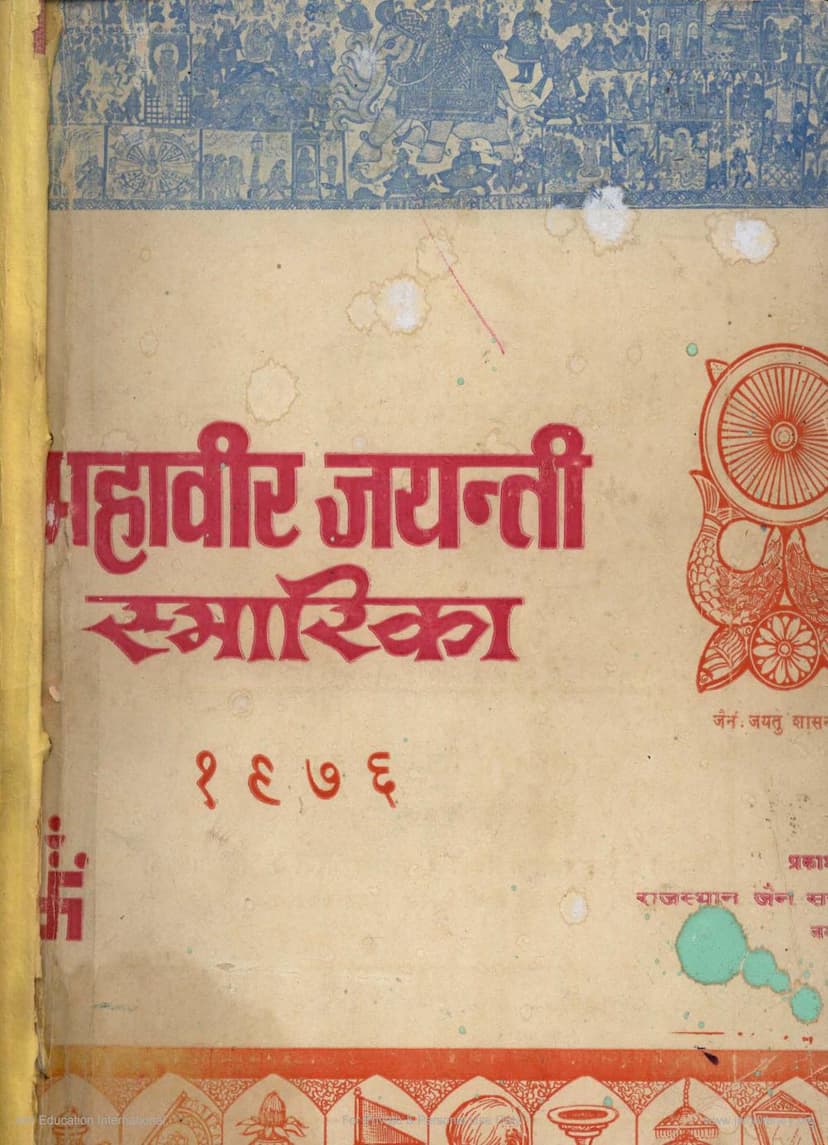Mahavira Jayanti Smarika 1976
Added to library: September 2, 2025

Summary
Here is a comprehensive summary of the provided Jain text, "Mahavira Jayanti Smarika 1976," focusing on its content and key themes:
Overview of the Publication:
- Title: Mahavira Jayanti Smarika 1976 (Souvenir for Mahavira Jayanti 1976)
- Publisher: Rajasthan Jain Sabha, Jaipur
- Chief Editor: Shri Bhanvarlal Polyaka
- Key Purpose: To commemorate Mahavira Jayanti and propagate the teachings of Lord Mahavira and Jainism.
- Content: The souvenir is a rich collection of articles on various aspects of Jainism, including the life and teachings of Lord Mahavira, Jain philosophy, history, art, literature, culture, and archaeology. It also features messages from prominent figures, details about the Rajasthan Jain Sabha, and advertisements.
Key Themes and Content Highlights:
-
Lord Mahavira's Life and Teachings:
- Central Figure: The entire publication is centered around Lord Mahavira, celebrating his birth anniversary. HHis Life Story: Several articles detail Mahavira's life from his birth (as Vardhamana), his renunciation, his rigorous penances, attainment of Kevala Jnana (omniscience), his discourse (Samvasarana), and his Nirvana. The text emphasizes his compassion, non-violence, truthfulness, and asceticism.
- Core Principles: The fundamental teachings of Mahavira, particularly Ahimsa (non-violence), Aparigraha (non-possession), and Anekantavada (non-absolutism/many-sidedness), are discussed extensively. The relevance of these principles to modern problems is highlighted.
- Anekantavada and Syadvada: These philosophical concepts are explained as Jainism's unique contribution to thought, emphasizing understanding multiple perspectives and avoiding dogmatism. Syadvada is presented as the language of Anekanta.
- Jain Ethics: The text delves into the five Mahavratas (great vows) and their application in both monastic (Mahavrata) and lay (Anuvrata) life, stressing the importance of ethical conduct for individual and societal well-being.
-
Jain Philosophy and Concepts:
- Ahimsa: Mahavira's doctrine of Ahimsa is presented not just as non-killing but as a comprehensive principle of non-violence in thought, word, and deed, extending compassion to all living beings. Its relevance in the modern context of war and conflict is explored.
- Aparigraha: The text discusses the concept of non-possession, emphasizing detachment from material possessions and the pursuit of inner contentment over external accumulation. It critiques greed and hoarding as root causes of societal conflict and suffering.
- Anekantavada and Syadvada: These philosophical tools are highlighted as Jainism's unique contribution to epistemology and logic, promoting tolerance, understanding, and the resolution of conflicts by acknowledging multiple perspectives.
- Karma Siddhanta: The Jain concept of karma and its role in shaping individual destiny is explained, emphasizing self-effort and responsibility for one's actions.
- Soul (Jiva): The nature of the soul as an eternal, conscious, and inherently pure substance is discussed, with the goal of its liberation from karmic bondage.
-
Historical and Cultural Context:
- Rajasthan Jain Sabha: The souvenir provides information about the Rajasthan Jain Sabha, its objectives, activities, and its dedicated efforts in publishing this annual souvenir for the past 13 years. It lists the office bearers and executive committee members for 1976.
- Jainism in Rajasthan: Several articles focus on the historical presence and influence of Jainism in Rajasthan, mentioning ancient Jain temples, sculptures, inscriptions, and the patronage extended by Rajput rulers. The contributions of Jain scholars and historical figures are also highlighted.
- Jaina Art and Architecture: The publication features discussions and descriptions of Jain temples, sculptures (like the Jain cave temple at Nashik, though the article title is "Nāgārjuna ki Jain Gufā," the description points to Nashik), and artistic representations of Jain Tirthankaras and symbols.
- Jaina Literature: There's a significant focus on Jaina literature, including traditional scriptures, Puranas, historical accounts, and even poetic works like "Parśvābhyudaya" and "Mānav" (a poem). The text mentions the extensive literature in Sanskrit, Prakrit, Apabhramsa, Tamil, and Kannada, showcasing the broad historical reach of Jain writings. The role of Jain scholars in preserving and contributing to literature is noted.
- Mahavira Jayanti Celebrations: The text implicitly covers the spirit of Mahavira Jayanti celebrations by publishing this souvenir, which itself is a product of such commemoration.
- Social Reform: The articles touch upon Mahavira's teachings on social equality, the upliftment of women, and the critique of social evils like casteism and exploitative practices, advocating for a more just and equitable society.
-
Scholarly Contributions:
- The souvenir is a compilation of articles by various scholars, professors, and writers, offering diverse perspectives on Jainism and Lord Mahavira. This includes contributions from figures like Dr. Panna Lal, Dr. H.P. Verma, Dr. Kamal Chand Sogani, Dr. K.C. Jain, Dr. H.C. Bhartill, and many others, covering a wide range of academic disciplines.
- Specific Articles: Notable articles include detailed analyses of Mahavira's ethical principles, philosophical concepts (like Anekantavada), historical context, and the relevance of his teachings today. The articles also delve into Jaina art, literature (like the critique of "Sthūlabhadra Guṇamālā" and discussion of "Pārsavābhyudaya"), and archaeology, particularly in Rajasthan.
-
Editorial and Organizational Aspects:
- The publication highlights the organizational structure of the Rajasthan Jain Sabha, listing its office bearers and committee members.
- The editorial team, including the chief editor, managing editor, and editorial board members, is acknowledged, indicating a collaborative effort.
- The souvenir also thanks advertisers and the printing press for their contributions.
-
Messages and Greetings:
- The souvenir includes goodwill messages from prominent national figures, including the President of India, the Vice-President of India, and various Union and State Ministers, underscoring the national importance and respect accorded to Mahavira Jayanti and Jain teachings.
Overall Tone and Message:
The Mahavira Jayanti Smarika 1976 serves as a comprehensive tribute to Lord Mahavira and Jainism. It aims to educate, inspire, and remind its readers of the timeless relevance of Mahavira's teachings for individual spiritual growth, societal harmony, and universal peace. The articles showcase a blend of devotional reverence, philosophical depth, historical inquiry, and literary appreciation, all unified by the central theme of celebrating Mahavira's legacy. The emphasis on applying these ancient principles to contemporary challenges is a recurring motif throughout the publication.